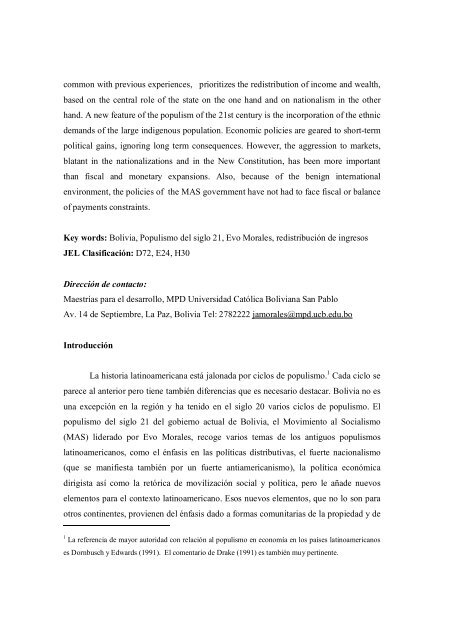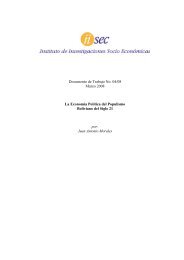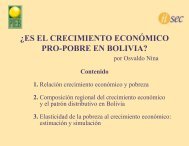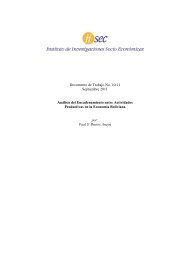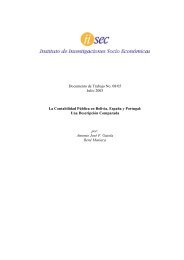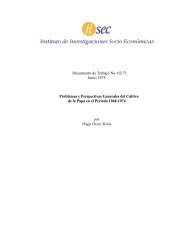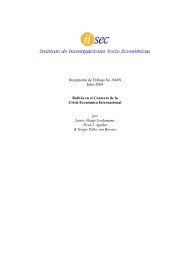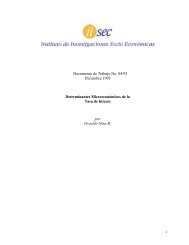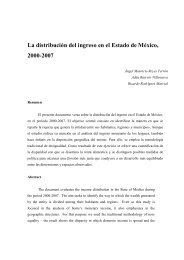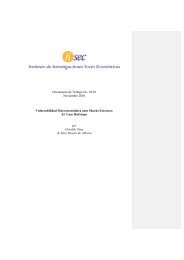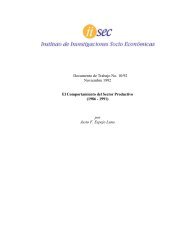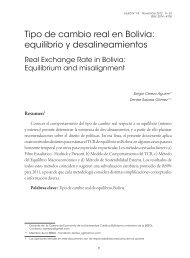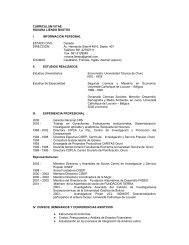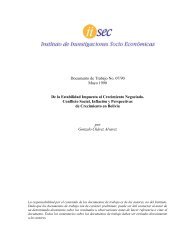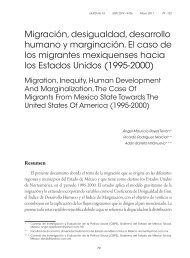4-La EconomÃa PolÃtica del Populismo Boliviano del Siglo 21 - iisec
4-La EconomÃa PolÃtica del Populismo Boliviano del Siglo 21 - iisec
4-La EconomÃa PolÃtica del Populismo Boliviano del Siglo 21 - iisec
Create successful ePaper yourself
Turn your PDF publications into a flip-book with our unique Google optimized e-Paper software.
common with previous experiences, prioritizes the redistribution of income and wealth,<br />
based on the central role of the state on the one hand and on nationalism in the other<br />
hand. A new feature of the populism of the <strong>21</strong>st century is the incorporation of the ethnic<br />
demands of the large indigenous population. Economic policies are geared to short-term<br />
political gains, ignoring long term consequences. However, the aggression to markets,<br />
blatant in the nationalizations and in the New Constitution, has been more important<br />
than fiscal and monetary expansions. Also, because of the benign international<br />
environment, the policies of the MAS government have not had to face fiscal or balance<br />
of payments constraints.<br />
Key words: Bolivia, <strong>Populismo</strong> <strong>del</strong> siglo <strong>21</strong>, Evo Morales, redistribución de ingresos<br />
JEL Clasificación: D72, E24, H30<br />
Dirección de contacto:<br />
Maestrías para el desarrollo, MPD Universidad Católica Boliviana San Pablo<br />
Av. 14 de Septiembre, <strong>La</strong> Paz, Bolivia Tel: 2782222 jamorales@mpd.ucb.edu.bo<br />
Introducción<br />
<strong>La</strong> historia latinoamericana está jalonada por ciclos de populismo. 1 Cada ciclo se<br />
parece al anterior pero tiene también diferencias que es necesario destacar. Bolivia no es<br />
una excepción en la región y ha tenido en el siglo 20 varios ciclos de populismo. El<br />
populismo <strong>del</strong> siglo <strong>21</strong> <strong>del</strong> gobierno actual de Bolivia, el Movimiento al Socialismo<br />
(MAS) liderado por Evo Morales, recoge varios temas de los antiguos populismos<br />
latinoamericanos, como el énfasis en las políticas distributivas, el fuerte nacionalismo<br />
(que se manifiesta también por un fuerte antiamericanismo), la política económica<br />
dirigista así como la retórica de movilización social y política, pero le añade nuevos<br />
elementos para el contexto latinoamericano. Esos nuevos elementos, que no lo son para<br />
otros continentes, provienen <strong>del</strong> énfasis dado a formas comunitarias de la propiedad y de<br />
1 <strong>La</strong> referencia de mayor autoridad con relación al populismo en economía en los países latinoamericanos<br />
es Dornbusch y Edwards (1991). El comentario de Drake (1991) es también muy pertinente.


